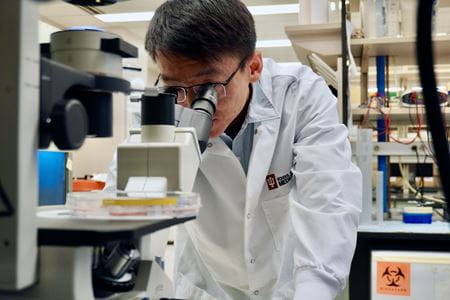INDIANAPOLIS — Indiana University School of Medicine scientists have been awarded a new four-year, $3.2 million grant from the National Heart, Lung, and Blood Institute for research aimed at enhancing therapies like bone marrow transplants, which are critical for treating blood disorders and cancers. The team will explore the benefits of low oxygen levels on hematopoietic stem cells.
Results from this study could expand the reach of advanced stem cell therapies and lead to new strategies for treating a range of blood disorders, including leukemia, anemia and genetic conditions.
Hematopoietic stem cells, found in bone marrow and cord blood, are responsible for producing all types of mature blood cells. Their ability to self-renew and regenerate damaged cells makes them invaluable for treating both malignant and non-malignant blood diseases through transplantation. However, acquiring and expanding these cells remains a significant challenge.
The research team, co-led by Reuben Kapur, PhD, and Ji Zhang, PhD, both researchers at the IU School of Medicine's Herman B Wells Center for Pediatric Research and the IU Melvin and Bren Simon Comprehensive Cancer Center, seeks to address these barriers.
"The rarity of hematopoietic stem cells and the difficulty of expanding them can be a limitation for their applications," said Zhang, an associate professor of pediatrics at the IU School of Medicine. "Understanding the optimal environments in which these cells regenerate and thrive is key to improving life-saving therapies like stem cell transplants, especially for patients with limited stem cell donor options."
The new research will build on the team's previous findings that low-oxygen environments, known as hypoxia, enhance hematopoietic stem cell function. The group will examine how hypoxia activates beneficial cell attributes and explore the potential to manipulate these processes in higher, more common oxygen-level conditions.
"By uncovering ways to recreate the benefits of hematopoietic stem cells outside of the body, we hope to develop strategies that enhance their clinical potential, whether for transplantation, CAR-T therapy or other gene editing procedures," said Kapur, director of the Wells Center and co-leader of the Hematopoiesis and Hematologic Malignancies Program at the IU Simon Comprehensive Cancer Center.
About the Indiana University School of Medicine
The IU School of Medicine is the largest medical school in the U.S. and is annually ranked among the top medical schools in the nation by U.S. News & World Report. The school offers high-quality medical education, access to leading medical research and rich campus life in nine Indiana cities, including rural and urban locations consistently recognized for livability. According to the Blue Ridge Institute for Medical Research, the IU School of Medicine ranks No. 13 in 2023 National Institutes of Health funding among all public medical schools in the country.
Writer: Jackie Maupin, jacmaup@iu.edu
For more news, visit the IU School of Medicine Newsroom: medicine.iu.edu/news




